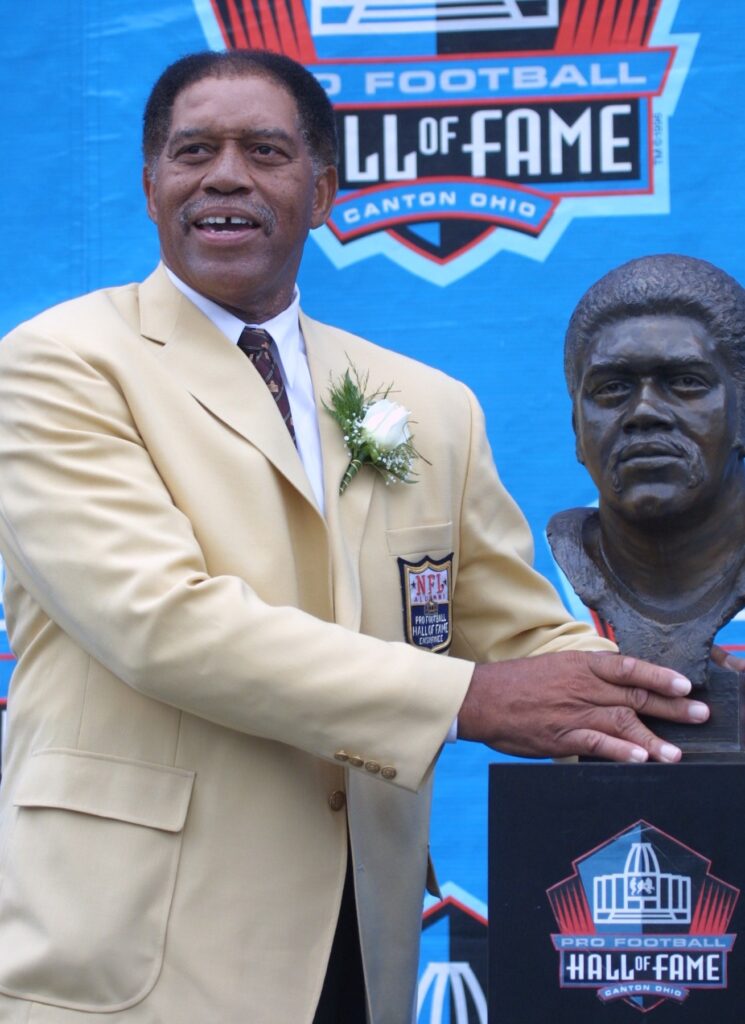
Sport: Football
Born: March 1, 1946
Town: Trenton
Elvin Lamont Bethea was born and raised in Trenton. He was actually born Carey, not Bethea, because his parents—Henrietta and Jesse—had not yet married. Eight siblings followed. Much of his childhood was spent in rural Lawrence Township in a house that lacked indoor plumbing. He was a big kid—the neighborhood kids called him “The Bear”—who excelled at several sports, including soccer and baseball. In grade school, he nearly lost an eye during a soccer game. His first taste of organized football came as a high-school freshman.
Elvin played the line on both sides of the ball for Pat Celemens at Trenton High School and was also state champion in the discus as a senior. Newspapers called him “The Trenton Strongboy.” He earned a scholarship to North Carolina A&T in 1964 and played defensive end for Bert Piggott, an African-American coach who had played in a Rose Bowl and also professionally in the AAFC. Piggott sent a half-dozen players to the pros during his dozen years leading the Aggies. A&T built a powerhouse team around Elvin. The fioollowing Elvin’s graduation, the Aggies—under rookie head coach Hornsby Howell—went 8–1 and were rated as the nation’s top “black college” team.
In the 1968 pro football draft, Elvin inexplicably dropped to the third round. He was snapped up by the Houston Oilers. There was CFL interest in Elvin because a cousin, Willie Bethea, had become a star north of the border. However, Elvin was intent on testing himself against the best of the best. Elvin started his first game as a rookie and stayed in the lineup for 135 consecutive games until breaking his arm in a 1977 contest against the Raiders. Elvin was a strong, smart and durable defensive lineman. He excelled as a pass rusher but was also a sure tackler. It typically took two blockers to neutralize him.
The team Elvin joined had been an American Football League powerhouse in the 1960s, but in the early 1970s the Oilers bottomed out. The arrival of coach Bum Phillips and the addition of defensive standouts Curley Culp and Robert Brazile reversed the team’s fortunes. Elvin played right defensive end in Phillips’ 3–4 defense.
In the late 1970s, when Earl Campbell and Dan Pastorini were in their primes, the Oilers became perennial playoff contenders. In 1978 and 1979, they came within one victory of reaching the Super Bowl, losing to the Steelers in the AFC Championship Game both times.
Elvin played 16 seasons in the NFL, and went to the Pro Bowl 8 times. He was a second-team All-Pro on four occasions. Elvin retired with team records for most seasons and games played. Although unofficial, the 105 sacks with which he was credited (including a personal-best 16 in 1973) also established a new Oilers mark. Elvin’s best day as a pass-rusher came against the Chargers in 1976. He dumped the quarterback four times and caused one fumble.
Elvin called it a career after the 1983 season. The team retired his #65 jersey and in 2005 he was elected to the Pro Football Hall of Fame. He went on to enjoy a successful second career working for Anheuser Busch.